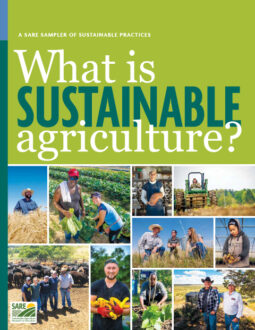Many of the ecological strategies farmers use to manage pest insects, weeds and diseases not only result in fewer pesticide applications but also create a healthier and more sustainable farm overall. Some of the most effective approaches include promoting biodiversity on the farm, rotating crops, conserving habitat for beneficial insects and using practices that improve soil health. Learning about your problem pests through regular scouting, identification and monitoring, and following integrated pest management (IPM) practices are also key.
“Ecological Pest Management," the fifth episode in “What is Sustainable Agriculture?” animation series, introduces key components of ecological pest management and is intended to complement more detailed training materials.
Sampler of Projects
Attracting Beneficial Insects to Urban Farms
SARE project FNC17-1083
EarthDance is a teaching farm located in Ferguson, Mo., that focuses on providing youth programs, volunteer opportunities and other activities to help connect the local community to the land. The team at EarthDance uses organic practices to grow almost 90 varieties of crops on 2.3 acres. Always seeking ways to improve the sustainability of their farm, they used a SARE Farmer/Rancher grant to incorporate both permaculture and IPM practices. Their main objective was to establish plots of 25 species of native perennial flowers around the farm. The group also tested the use of insect netting instead of row covers to exclude insects from tender crops. Over the course of the project, the group found the established wildflower plots began to attract a wider variety of beneficial pollinators and pest predators, to the point that they were able to achieve improved yields while lowering their use of organic sprays.
Cover Crops for Weed Suppression in Dry Western Orchards
SARE project GW19-194
While farmers and researchers are increasingly turning their attention to cover crops because of the many benefits they provide, the practice is slower to gain ground in some parts of the country. For example, there is little research available on how cover crops can fit into perennial cropping systems in the arid West. University of California, Davis graduate student Steven Haring took this as his cue to explore their potential. Using a SARE Graduate Student grant, he and his faculty advisor looked specifically at whether winter cover crops can improve weed management in California’s plentiful orchard farms. Haring evaluated different cover crop and management practices in a commercial walnut orchard to assess which approaches might result in improved non-chemical weed control. He found that the presence of a cover crop did provide weed control and that trying to increase cover crop biomass didn’t result in decreasing weed biomass.
Providing Good Quality, Disease-Resistant Squashes for Southern Growers
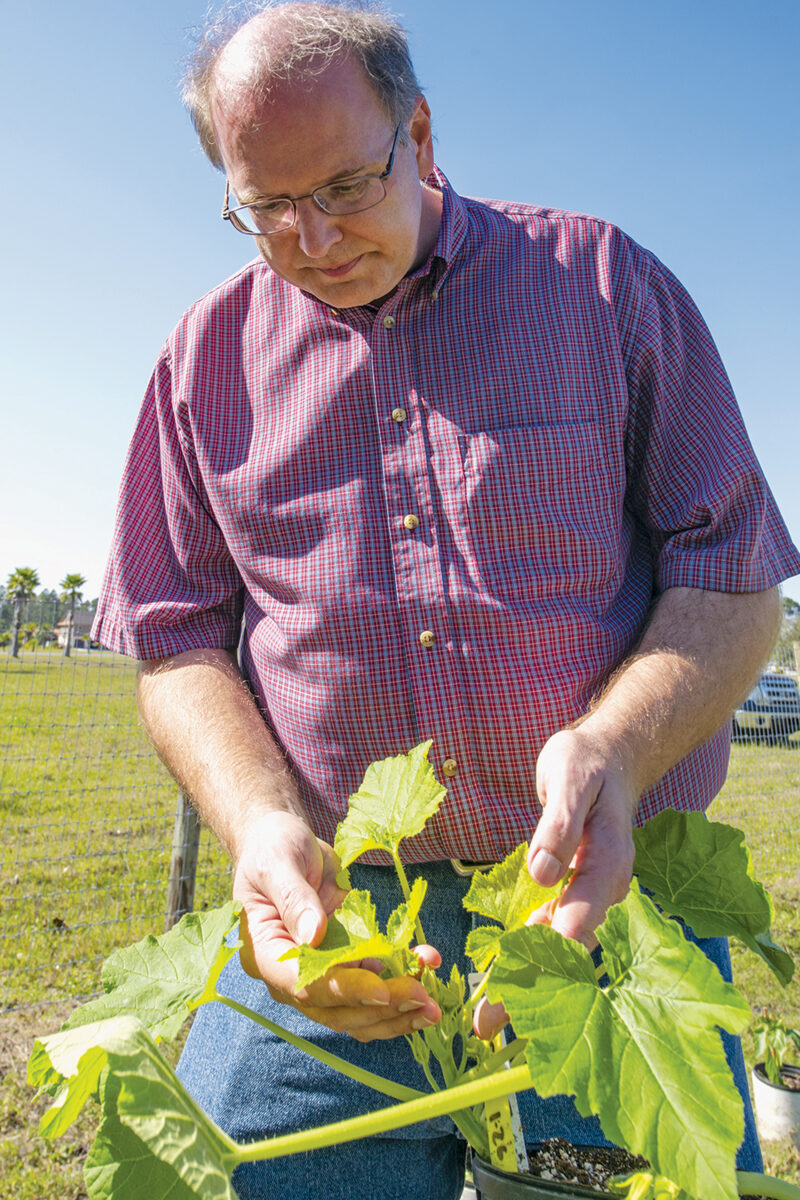
SARE projects FS20-325, FS16-291 and FS13-273
For many years, downy mildew has been the primary limiting factor to cucurbit production at Twin Oaks Seed Farm in Louisa, Va., to the extent that some years the disease has caused entire crop failures. So, farmer Edmund Frost set out to develop crop varieties that combined strong disease resistance with desirable characteristics like size and taste. Supported by a SARE Producer grant, his initial efforts involved extensive variety trials of cucumbers, melons and winter squash, as well as selection work from a cross he made between a tropical pumpkin variety and a northern butternut squash. The resulting butternut squash, called South Anna, takes advantage of the disease resistance of the pumpkin and the fruit quality characteristics of the squash. Frost has received two additional SARE grants to continue improving his disease-resistant squash varieties by crossing them with other varieties to create different sizes and flavor profiles, and to bring out other desirable characteristics like storage quality and uniformity.
The Role of Barn Owls in Providing Rodent Control
SARE projects GW19-200 and SW18-063
Barn owls and other raptors can play an important role in controlling the populations of rodent pests in farm fields, including across the western United States. Supported by two SARE grants, researchers at the University of California, Davis wanted to study the contributions these birds make to rodent control and, critically, to explore whether farmers’ use of rodenticides had a negative effect on bird health. Professor Joshua Hull and graduate student Breanna Martinico monitored the activity of barn owls and hawks on four farms and analyzed them for signs of rodenticides in their blood and pellets. The team found that the birds do in fact consume a significant amount of mice, voles and other pests near their habitats, but the presence of rodenticides in their bodies was low. This could be because farmers’ use of the chemicals didn’t coincide with the timing and location of raptor activity, according to the team.
Ecological Pest Management Resources
Information for farmers, ranchers, educators and researchers who are seeking to use ecological pest management practices.
Stories from the Field
Here are some of the ways SARE grantees are improving farm and ranch sustainability with ecological pest management.
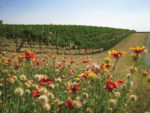
Profile: Habitat Restoration Brings Beneficial Insects and Fewer Pests to the Vineyard
Washington winegrape growers have significantly cut their use of pesticides in recent years thanks to integrated pest management practices, and now a SARE-funded research team is taking them further with native habitat restoration and improved biological pest control.
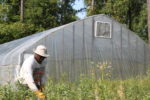
Using Locally Sourced Wood Chips for Effective Weed Management
" "Locally available hardwood mulch not only controls weeds when properly applied, but also helps with water retention, and can help increase production of vegetable crops." Patrick Johnson, NANIH Farm and Garden " THE CHALLENGE Weed control can be a constant struggle for organic growers, who cannot use the herbicides typically employed by conventional farmers.…
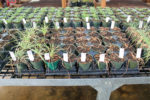
Equipping Farmers with Tools to Manage Herbicide-Resistant Weeds
"Montana State University Extension agents and crop consultants mentioned that this was a much-needed educational program for dealing with herbicide resistance." Prashant Jha, Montana State University THE CHALLENGE Herbicide-resistant weeds have emerged in many parts of the country as one of the biggest threats to the sustainability of agriculture. A recent survey revealed that 59% […]
Resources and Learning
Browse all of SARE's resources on ecological pest management. Examples include:
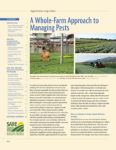
A Whole Farm Approach to Managing Pests
This 16-page bulletin helps producers—and the educators who work with them—use ecological principles across the entire farm to control pests.
The post id 80006 does not exist on www.sare.org.
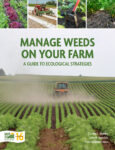
Manage Weeds On Your Farm
Manage Weeds on Your Farm is a definitive guide to understanding agricultural weeds and how to manage them efficiently, effectively and ecologically—for organic and conventional farmers alike.
